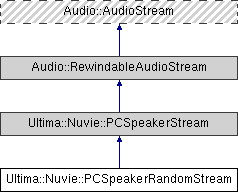|
|
| PCSpeakerRandomStream (uint start, uint16 d, uint16 s) |
| |
|
uint32 | getLengthInMsec () |
| |
|
uint16 | getNextFreqValue () |
| |
| int | readBuffer (sint16 *buffer, const int numSamples) override |
| |
| bool | isStereo () const override |
| |
| int | getRate () const override |
| |
| bool | endOfData () const override |
| |
| bool | rewind () override |
| |
| virtual bool | endOfStream () const |
| |
|
|
uint16 | base_val |
| |
|
uint16 | duration |
| |
|
uint16 | stepping |
| |
|
uint32 | rand_value |
| |
|
uint32 | sample_pos |
| |
|
uint32 | total_samples_played |
| |
|
uint32 | samples_per_step |
| |
|
uint32 | num_steps |
| |
|
uint32 | cur_step |
| |
|
PCSpeaker * | pcspkr |
| |
|
bool | finished |
| |
◆ readBuffer()
| int Ultima::Nuvie::PCSpeakerRandomStream::readBuffer |
( |
sint16 * |
buffer, |
|
|
const int |
numSamples |
|
) |
| |
|
overridevirtual |
Fill the given buffer with up to numSamples samples.
Data must be in native endianness, 16 bits per sample, signed. For stereo stream, the buffer will be filled with interleaved left and right channel samples, starting with the left sample. Furthermore, the samples in the left and right are summed up. So if you request 4 samples from a stereo stream, you will get a total of two left channel and two right channel samples.
- Returns
- The actual number of samples read, or -1 if a critical error occurred.
- Note
- You must check whether the returned value is less than what you requested. This indicates that the stream is fully used up.
Implements Audio::AudioStream.
The documentation for this class was generated from the following file:

 Public Member Functions inherited from Ultima::Nuvie::PCSpeakerStream
Public Member Functions inherited from Ultima::Nuvie::PCSpeakerStream Public Member Functions inherited from Audio::AudioStream
Public Member Functions inherited from Audio::AudioStream Protected Attributes inherited from Ultima::Nuvie::PCSpeakerStream
Protected Attributes inherited from Ultima::Nuvie::PCSpeakerStream